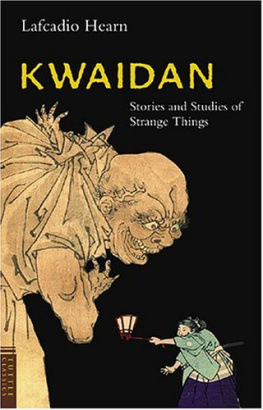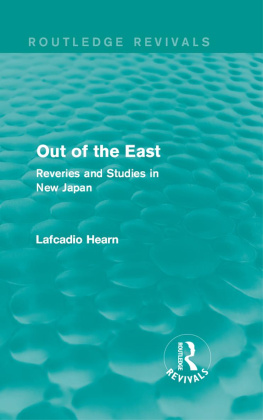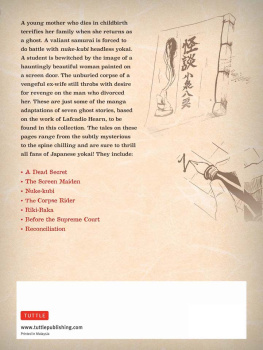Hearn - Kwaidan: Stories and Studies of Strange Things
Here you can read online Hearn - Kwaidan: Stories and Studies of Strange Things full text of the book (entire story) in english for free. Download pdf and epub, get meaning, cover and reviews about this ebook. year: 2010, publisher: B&R Samizdat Express, genre: Detective and thriller. Description of the work, (preface) as well as reviews are available. Best literature library LitArk.com created for fans of good reading and offers a wide selection of genres:
Romance novel
Science fiction
Adventure
Detective
Science
History
Home and family
Prose
Art
Politics
Computer
Non-fiction
Religion
Business
Children
Humor
Choose a favorite category and find really read worthwhile books. Enjoy immersion in the world of imagination, feel the emotions of the characters or learn something new for yourself, make an fascinating discovery.
- Book:Kwaidan: Stories and Studies of Strange Things
- Author:
- Publisher:B&R Samizdat Express
- Genre:
- Year:2010
- Rating:3 / 5
- Favourites:Add to favourites
- Your mark:
- 60
- 1
- 2
- 3
- 4
- 5
Kwaidan: Stories and Studies of Strange Things: summary, description and annotation
We offer to read an annotation, description, summary or preface (depends on what the author of the book "Kwaidan: Stories and Studies of Strange Things" wrote himself). If you haven't found the necessary information about the book — write in the comments, we will try to find it.
Hearn: author's other books
Who wrote Kwaidan: Stories and Studies of Strange Things? Find out the surname, the name of the author of the book and a list of all author's works by series.
Kwaidan: Stories and Studies of Strange Things — read online for free the complete book (whole text) full work
Below is the text of the book, divided by pages. System saving the place of the last page read, allows you to conveniently read the book "Kwaidan: Stories and Studies of Strange Things" online for free, without having to search again every time where you left off. Put a bookmark, and you can go to the page where you finished reading at any time.
Font size:
Interval:
Bookmark:
_________________
Published by B&R Samizdat Express. Feedback welcome seltzer@samizdat.com
________________
A Note from the Digitizer On Japanese Pronunciation
Although simplified, the following general rules will help the reader unfamiliar with Japanese to come close enough to Japanese pronunciation.
There are five vowels: a (as in fAther), i (as in machIne), u (as in fOOl), e (as in fEllow), and o (as in mOle). Although certain vowels become nearly "silent" in some environments, this phenomenon can be safely ignored for the purpose at hand.
Consonants roughly approximate their corresponding sounds in English, except for r, which is actually somewhere between r and l (this is why the Japanese have trouble distinguishing between English r and l), and f, which is much closer to h.
The spelling "KWAIDAN" is based on premodern Japanese pronunciation; when Hearn came to Japan, the orthography reflecting this pronunciation was still in use. In modern Japanese the word is pronounced KAIDAN.
There are many ellipses in the text. Hearn often used them in this book; they do not represent omissions by the digitizer.
Author's original notes are in brackets, those by the digitizer are in parentheses. Diacritical marks in the original are absent from this digitized version.
The publication of a new volume of Lafcadio Hearn's exquisite studies of Japan happens, by a delicate irony, to fall in the very month when the world is waiting with tense expectation for news of the latest exploits of Japanese battleships. Whatever the outcome of the present struggle between Russia and Japan, its significance lies in the fact that a nation of the East, equipped with Western weapons and girding itself with Western energy of will, is deliberately measuring strength against one of the great powers of the Occident. No one is wise enough to forecast the results of such a conflict upon the civilization of the world. The best one can do is to estimate, as intelligently as possible, the national characteristics of the peoples engaged, basing one's hopes and fears upon the psychology of the two races rather than upon purely political and statistical studies of the complicated questions involved in the present war. The Russian people have had literary spokesmen who for more than a generation have fascinated the European audience. The Japanese, on the other hand, have possessed no such national and universally recognized figures as Turgenieff or Tolstoy. They need an interpreter.
It may be doubted whether any oriental race has ever had an interpreter gifted with more perfect insight and sympathy than Lafcadio Hearn has brought to the translation of Japan into our occidental speech. His long residence in that country, his flexibility of mind, poetic imagination, and wonderfully pellucid style have fitted him for the most delicate of literary tasks. Hi has seen marvels, and he has told of them in a marvelous way. There is scarcely an aspect of contemporary Japanese life, scarcely an element in the social, political, and military questions involved in the present conflict with Russia which is not made clear in one or another of the books with which he has charmed American readers.
He characterizes Kwaidan as "stories and studies of strange things." A hundred thoughts suggested by the book might be written down, but most of them would begin and end with this fact of strangeness. To read the very names in the table of contents is like listening to a Buddhist bell, struck somewhere far away. Some of his tales are of the long ago, and yet they seem to illumine the very souls and minds of the little men who are at this hour crowding the decks of Japan's armored cruisers. But many of the stories are about women and children,--the lovely materials from which the best fairy tales of the world have been woven. They too are strange, these Japanese maidens and wives and keen-eyed, dark-haired girls and boys; they are like us and yet not like us; and the sky and the hills and the flowers are all different from ours. Yet by a magic of which Mr. Hearn, almost alone among contemporary writers, is the master, in these delicate, transparent, ghostly sketches of a world unreal to us, there is a haunting sense of spiritual reality.
In a penetrating and beautiful essay contributed to the "Atlantic Monthly" in February, 1903, by Paul Elmer More, the secret of Mr. Hearn's magic is said to lie in the fact that in his art is found "the meeting of three ways." "To the religious instinct of India--Buddhism in particular,--which history has engrafted on the aesthetic sense of Japan, Mr. Hearn brings the interpreting spirit of occidental science; and these three traditions are fused by the peculiar sympathies of his mind into one rich and novel compound,--a compound so rare as to have introduced into literature a psychological sensation unknown before." Mr. More's essay received the high praise of Mr. Hearn's recognition and gratitude, and if it were possible to reprint it here, it would provide a most suggestive introduction to these new stories of old Japan, whose substance is, as Mr. More has said, "so strangely mingled together out of the austere dreams of India and the subtle beauty of Japan and the relentless science of Europe."
March, 1904.
= = = = = = = *** = = = = = = =
Most of the following Kwaidan, or Weird Tales, have been taken from old Japanese books,--such as the Yaso-Kidan, Bukkyo-Hyakkwa-Zensho, Kokon-Chomonshu, Tama-Sudare, and Hyaku-Monogatari. Some of the stories may have had a Chinese origin: the very remarkable "Dream of Akinosuke," for example, is certainly from a Chinese source. But the story-teller, in every case, has so recolored and reshaped his borrowing as to naturalize it... One queer tale, "Yuki-Onna," was told me by a farmer of Chofu, Nishitama-gori, in Musashi province, as a legend of his native village. Whether it has ever been written in Japanese I do not know; but the extraordinary belief which it records used certainly to exist in most parts of Japan, and in many curious forms... The incident of "Riki-Baka" was a personal experience; and I wrote it down almost exactly as it happened, changing only a family-name mentioned by the Japanese narrator.
L.H.
Tokyo, Japan, January 20th, 1904.
More than seven hundred years ago, at Dan-no-ura, in the Straits of Shimonoseki, was fought the last battle of the long contest between the Heike, or Taira clan, and the Genji, or Minamoto clan. There the Heike perished utterly, with their women and children, and their infant emperor likewise--now remembered as Antoku Tenno. And that sea and shore have been haunted for seven hundred years... Elsewhere I told you about the strange crabs found there, called Heike crabs, which have human faces on their backs, and are said to be the spirits of the Heike warriors [1]. But there are many strange things to be seen and heard along that coast. On dark nights thousands of ghostly fires hover about the beach, or flit above the waves,--pale lights which the fishermen call Oni-bi, or demon-fires; and, whenever the winds are up, a sound of great shouting comes from that sea, like a clamor of battle.
In former years the Heike were much more restless than they now are. They would rise about ships passing in the night, and try to sink them; and at all times they would watch for swimmers, to pull them down. It was in order to appease those dead that the Buddhist temple, Amidaji, was built at Akamagaseki [2]. A cemetery also was made close by, near the beach; and within it were set up monuments inscribed with the names of the drowned emperor and of his great vassals; and Buddhist services were regularly performed there, on behalf of the spirits of them. After the temple had been built, and the tombs erected, the Heike gave less trouble than before; but they continued to do queer things at intervals,--proving that they had not found the perfect peace.
Font size:
Interval:
Bookmark:
Similar books «Kwaidan: Stories and Studies of Strange Things»
Look at similar books to Kwaidan: Stories and Studies of Strange Things. We have selected literature similar in name and meaning in the hope of providing readers with more options to find new, interesting, not yet read works.
Discussion, reviews of the book Kwaidan: Stories and Studies of Strange Things and just readers' own opinions. Leave your comments, write what you think about the work, its meaning or the main characters. Specify what exactly you liked and what you didn't like, and why you think so.












